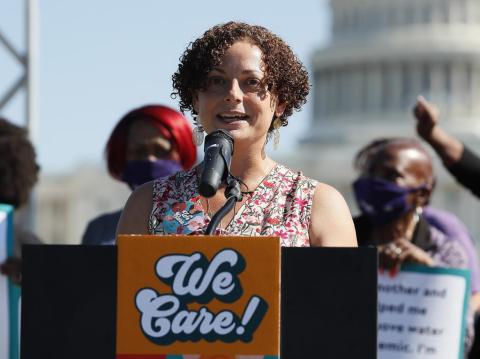
Can You Hear Us? How Toxic Masculinity is Hurting Our Political Process and Our Communities
If you are still grappling with the results of the most recent presidential election, you are not alone. The pandemic and the years that followed have made me even more aware of the challenges women face in society. There have been so many events in my life that have made me think about just how much I have struggled to be heard, how important it is for us to listen to one another, and that we as a society are simply not listening to women. We are not listening to women’s perspectives, women’s suffering, women’s experiences, and women’s wisdom, and it is hurting all of us.
I thought I had seen the height of toxic masculinity when I worked for two “golden bachelors” who owned a small business on the East Coast. There was copious amounts of ogling of women, commenting on women’s bodies, commenting on women’s grooming, outfits, and probable prowess in the sheets. Any woman who disagreed with them was a “piece of work,” and they did everything to avoid those types of women.
Then toward the end of the pandemic we moved to a new neighborhood an hour away, and I continued to see more patterns of toxic behaviors by men. Folks in a local music group, run by a conservative couple, joked about sexual topics regularly, and men commented on women’s appearance without a care in the world, or a thought to considerations of sexual harassment or unprofessional behavior.
At a holiday party, the husband asked me - “can we go back to talking about boobies?” I had brought up a political topic, and I suppose he wasn’t up for that. I once tried to tell him that I was a survivor of childhood abuse, and don’t respond well to bullying behavior, and his response was, “yeah, me too.” Followed by a stare that said, “so stop whining about it.”
As I talked to them more, I realized that no one was listening to what I was saying because they were busy paying attention to what I looked like, or trying to determine whether they liked me or not. The actual words I was uttering were not, in fact, relevant, and were most commonly dismissed outright or simply ignored.
While watching CNN with a friend, a reporter of color came on the screen, and as she began talking, he began dissecting her appearance. Because she did not fit the Barbie doll stereotype he enjoyed, he immediately dismissed every word she said. When the reporter was a more feminine presenting type, he simply commented on what he found attractive about that person, not the merit of what she was saying. When a male host came on, he quieted down and listened to his message.
I began to see this pattern over and over, including in my day to day interactions. If they think I’m cute they’re trying to figure a way in. If they don’t think I’m cute, all they want is for me to be quiet and go away, or be quiet and useful. Don’t speak up, don’t raise concerns, and absolutely, whatever you do, don’t complain.
As the election drew near, I saw more and more daily ads demonizing Angela Alsobrooks, a Black woman running for U.S Senate in Maryland, where I live. I found it to be extremely manipulative and triggering. Simultaneusly, coming to terms with the fact that our country had on the ballot for President of the United States, not just a man who publicly declared that he grabs women by the genitals, but was now a convicted felon of 34 counts of fraud and found civilly liable for sexual assault against a woman. Talking to a news reporter friend, he confessed that his roommates, whom he considers to be moderate, all believe that “Kamala slept her way to the top.”
I was saddened and disappointed that we are still facing this kind of rhetoric so often, and that our attitudes as a society toward women in general, especially in positions of authority, continue to be toxic. We have to examine why we are still struggling to listen openly to one another, regardless of gender and gender identity. It is a challenge we have to address if we are going to build healthier patterns, a more inclusive political process, and therefore a more inclusive society. This is why joining forces with MomsRising in raising women’s voices, so that we can be heard in our workplaces, in health care, in government, and in our daily lives, has been so important for me and my family.
Every woman and every person deserves a chance to be heard regardless of how they look, and we all have a right to be harsh when our boundaries are crossed, and be treated with the same deference as a man who is enforcing his own boundaries. If we continue to size women up in traditional ways, and we assign value only to those qualities that are pleasant to us, or non-threatening to us, we are leaving valuable teammates behind and doing ourselves a disservice.



The views and opinions expressed in this post are those of the author(s) and do not necessarily reflect those of MomsRising.org.
MomsRising.org strongly encourages our readers to post comments in response to blog posts. We value diversity of opinions and perspectives. Our goals for this space are to be educational, thought-provoking, and respectful. So we actively moderate comments and we reserve the right to edit or remove comments that undermine these goals. Thanks!